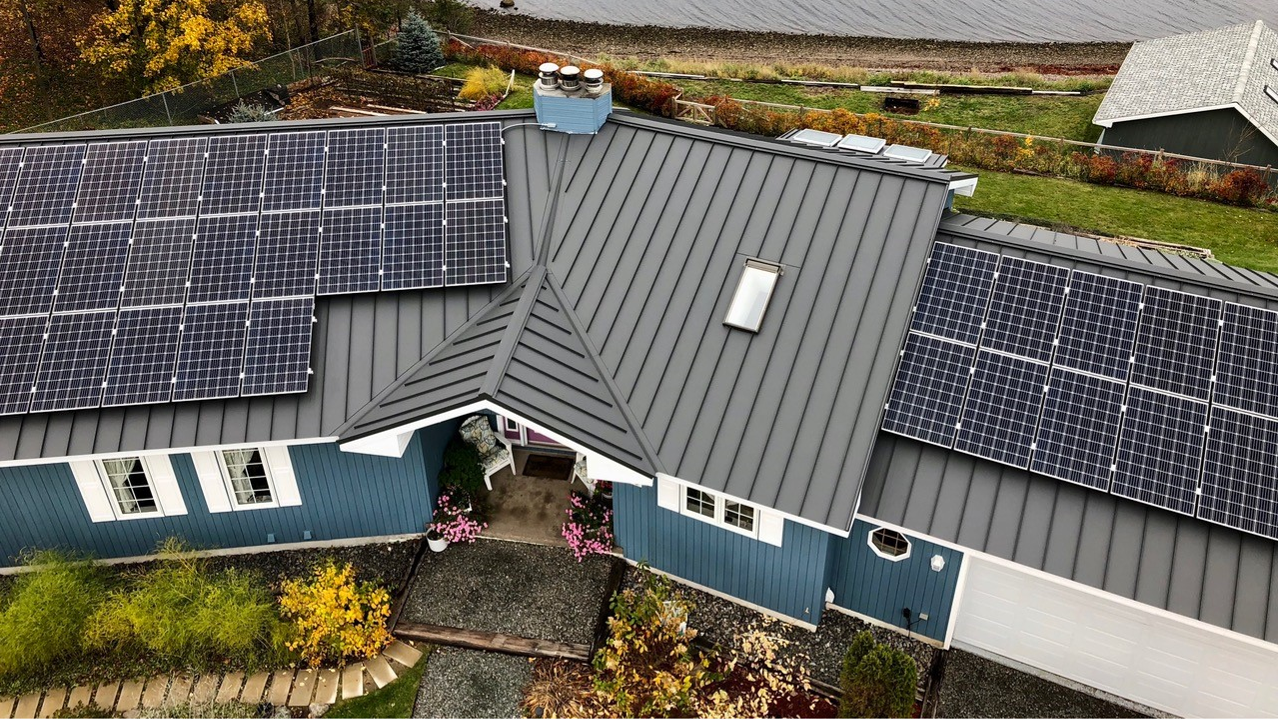The Making of a Megawatt

In the five years since its inception, the Antigonish Community Energy Co-op has fostered a megawatt of rooftop solar capacity across northern Nova Scotia, a feat they achieved primarily through buying in bulk.
It began with a pair of community meetings, in the fall of 2014 and again the following spring, at which a hundred or so people from Antigonish took a long, hard look at Nova Scotia’s energy mix. Recognizing the dominance of coal, oil and natural gas, residents decided they could do better. The Co-op was formed in the summer of 2015 to advance the cause of renewable power.
“We’re entirely independent, entirely volunteer” said David Morgan, who became president that June.
They settled on the “buyers co-op” business model, wherein they bring together members interested in purchasing rooftop solar arrays every year and make one large group purchase rather than several smaller ones. This allows them to secure discounts on the shipping of solar panels and on labour costs from partnering solar installers, specifically Appleseed Energy in West Arichat and Nova Sun Power in Pictou. The savings are modest, said Morgan, averaging 5-7 per cent, but they’re not insignificant, and far from the Co-op’s only benefit.
As Morgan described it, the Co-op has offered free property assessments to its members to gauge solar potential, organized several public information sessions on the power of renewables, led walkthroughs of solar homes to showcase the technology, and pulled off their group solar purchases every year for five years running. To date, they’ve empowered 123 households to install rooftop solar, from Tatamagouche in the west to Sydney in the east and Musquodoboit Harbour in the south.
The Co-op boasts a membership of 500 or so people with only a $5 entry fee, their cumulative investments in solar totaling just shy of $3 million. The megawatt they’ve established displaces 778 metric tonnes of carbon emissions annually (equivalent to removing 168 passenger vehicles from the road each year), and their lobbying of the provincial and federal governments has not gone unnoticed.
“In many ways, we feel the Co-op contributed substantially to the emergence of government incentive programs [for solar] in the province,” said Morgan. “We certainly made a lot of noise about the absence of incentive programs in our early years.”
When such incentives did arrive in 2018, the announcement was made in Antigonish, and the Co-op was named by MLA Randy Delorey. Incentives began at $1 per watt of installed solar capacity, which, said Morgan, covered about a third the cost of your average residential solar system, resulting in fifty installations on the Co-op’s following group purchase, their single largest. The incentive then dropped to $0.80 per watt and is now at $0.60 per watt, and the number of participants in the Co-op’s annual group purchases has reflected that drop.
Morgan said the technology itself has changed dramatically since the Co-op began its work in 2015, in particular the amount of power turned out by each individual solar panel. In their first group purchase in 2016, the average panel (manufactured by Canadian Solar) was rated at 250 watts. In their most recent 2020 group purchase, that had increased to 400 watts per panel.
The attitude of government toward solar has also changed dramatically. Morgan and his fellow volunteers have the distinct impression there will be enormous investments made by all levels of government into renewable power generally, and solar power in particular, in the near future. This impression has been given by their riding’s MP Sean Fraser, by the federal Liberal government’s handling of the fossil fuel industry, and by discussions of a green recovery following the pandemic.
“We have relatively high confidence,” said Morgan, “that the federal government is belatedly aware of the fact that the fossil fuel industry is dying, and no longer makes economic sense. We think investments in renewable energy are going to start appearing very soon.”
This, he said, could mean that provinces and municipalities are primed to invest in solar on behalf of their citizens, leveraging considerably more loaning, buying and discounting power than the Antigonish Community Energy Co-op. This, Morgan said, could mean the Co-op, and its volunteer mission to make solar affordable to residents of northern Nova Scotia, might soon be obsolete.
“We think that, in many ways, we’ve accomplished our mission,” said Morgan.
With their fifth group purchase already complete for 2020, the Co-op has instilled a moratorium on all future home assessments and group solar purchases, so they can be ready to reinvent themselves for the new normal, whatever that might be. This does not necessarily mean they’re closing their doors, stressed Morgan, but in a year’s time, the Co-op will likely look much different. Their exact direction depends on the vision of their membership, but regardless of the outcome, Morgan and colleagues intend to continue the cause of solar.
“The Co-op owes a tremendous debt to its membership and those who invested in solar through us,” he said. “We have our megawatt.”
ABOUT THE AUTHOR

Zack Metcalfe

About Powered by Communities
Established in 2017, Powered by Communities is an awareness-raising, communications and media platform that highlights and celebrates local community energy initiatives taking place across the country, from coast to coast to coast. The platform inspires, informs and engages its readership with stories and articles detailing community energy initiatives being led by local governments, municipalities, Indigenous communities, community groups, non-profits, charities, and enterprising individuals.

About QUEST Canada
QUEST Canada is a national non-profit that supports communities in Canada on their pathway to net-zero. Since 2007, we’ve been facilitating connections, empowering community champions and influencing decision-makers to implement efficient and integrated energy systems that best meet community needs and maximize local opportunities. We develop tools and resources, convene stakeholders and rights holders and advise decision-makers — all with the goal of encouraging and enabling communities to contribute to Canada’s net-zero goals.

Support local communities by sharing this story
MORE FROM POWERED BY COMMUNITIES
Sign Up
Join the Conversation!
Sign up to get the latest news and updates about QUEST Canada events and receive QUEST Canada's monthly newsletter.




